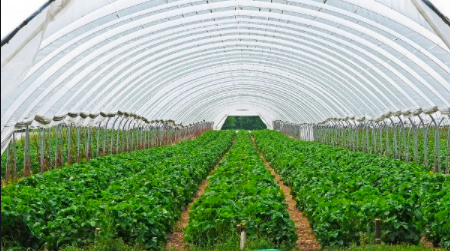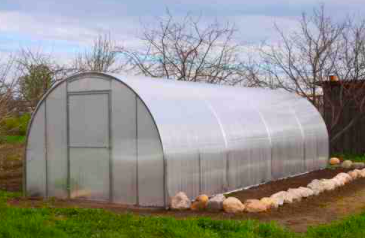This page is also available in: हिन्दी (Hindi)
A house or structure made of transparent material such as glass or polyethylene where plants grow and develop under controlled climatic conditions is a polyhouse or a greenhouse. As per the need, the structure size will vary from small shacks to large-sized buildings. Overall, as the house prevents the greenhouse gas from escaping, a greenhouse is a glasshouse whose interiors are warm when exposed to sunbeams. So the temperature inside is survival-friendly and comfortable for the plants when it’s cold outside.

Many people get confused between polyhouse and greenhouse. Polyhouse is a greenhouse of sorts, or we may say it’s a smaller greenhouse version where polyethylene is used as a cover. Polyhouse farming is a common greenhouse technology in developing countries like India due to its low construction and easy maintenance costs. Another greenhouse technology where wood is used as the cover is Lath Building. Compared to the greenhouse, the poly house is cheaper but the latter is longer-lasting than polyhouse.
Now let us talk about some benefits of polyhouse and why farmers, who are especially interested in organic farming should try it out!
Polyhouses are divided and have 2 different types, namely:
- Naturally ventilated polyhouse – With the exception of an adequate ventilation and fogger system, this sort of polyhouse or greenhouse does not have any environmental protection system to save crops from bad weather and natural pests and diseases.
- Environmentally controlled poly houses are mainly designed to prolong the growing duration of crops or to increase the yield of the off-season by regulating light, temperature, humidity, etc.
In addition, these polyhouse structures are divided into 3 subcategories.
- Low cost or low tech polyhouse.
- Medium cost or medium-tech polyhouse.
- Expensive or Hi-tech polyhouse.
- Low-tech polyhouse system: It is possible to build this polyhouse system with low-cost material and it is very simple to maintain this system. Polyhouse construction typically takes place with local materials, such as wood and bamboo. Generally, as a cladding material, Ultra Violet (UV) film is used. For cold climatic conditions, this sort is fitting. Using shade networks, temperature and humidity can be controlled. In this type of poly house, there will be no other regulated devices used
- Medium tech Polyhouse System: In this system, G is involved in the construction of poly houses. I have pipes (galvanized iron). The entire polyhouse frame is fixed to the ground to avoid any damage from the wind flow, and screws are mounted to the housing structure of the canopy cover. Humidity and temperature are controlled by arranging cooling pads, mist sensors, thermostats, and exhaust fans in this system. These kinds of poly houses can be adopted in dry and composite weather conditions. This is very useful where, during their life cycle, the plants need good care.
- Hi-tech polyhouse system: Hi-tech polyhouse provides an automatic temperature, humidity, fertilizer, irrigation, and other full environmental parameters control system at all times for growing crops.
POLYHOUSE COSTING
The cost of Polyhouse depends on the type of device and the construction area you select. Here are some specifics of the polyhouse construction cost. Such figures can vary from time to time and from area to region.
- Rs.400 to Rs.500/square meter for low-cost/low-tech polyhouse without exhaust fan systems and cooling pads.
- Medium cost/medium tech polyhouse (without automation) with refrigeration pads and exhaust fan systems costs Rs.900 to Rs.1200/square meter.
- A fully automatic control system hi-tech polyhouse costs Rs.2500 to Rs.4000/square met

Polyhouse can be used to grow various types of plants, crops, vegetables, and fruits. But the ones that are best suited for this method of farming are:
- Papaya, strawberry, etc. are fruits that can be grown in a polyhouse with ease.
- Cabbage, bitter gourd, capsicum, radish, cauliflower, chili, coriander, onion, spinach, tomato, etc. are vegetables that can be cultivated.
- It is also possible to grow flowers such as Carnation, Gerbera, Marigold, Orchid and Rose easily.
- Mushrooms can also be grown in polyhouse. You can read more about mushroom farming here.
Now that we have covered the basics, let us talk about what are the merits as well the demerits of this method.
Merits
By now, you already must have an idea about what polyhouse farming basically is. Now lets discuss some benefits of the same, as to why it is something that you should start and take up.
- Your plants are grown at a regulated temperature, so the chances of crop failure or harm are less likely.
- Throughout the year, you can grow crops and you will not have to wait for any particular season, which is very beneficial for production and income.
- The number of insects and rodents found in a polyhouse is much less as compared to normal farming techniques.
- The external climate will not have any effect on crop development.
- The product quality is clearly higher in polyhouse as compared to normal farming techniques.
- A polyhouse provides your crops with a healthy aeration and drainage system.
- Poly House provides your plants in every season with the right environmental facilities.
- It also improves production by about 5 to 10 times.
- The period for cropping is much lesser in polyhouse.
- The application of fertilizer is simpler and is automatically managed with the aid of drip irrigation.
One can get high returns with polyhouse without a doubt. The returns a farmer receives from Open Air Farming are very meager. Produce from Polyhouse Farming is 8 times more than normal farming. The returns often come from a high-profit margin. Poly House Farming Returns are more than 90 percent during the off-seasons, as per the data. While Poly House’s initial cost is higher, you can recover it in no time.
Demerits
Even though, as we have discussed, polyhouse is an excellent form of farming that is even good for off-season farming, it is not perfect! Although it has many benefits, there are some demerits as well to this method, which we have discussed below.
- Unlike artificial ones, farmers have slight control over airflow and temperature in the naturally ventilated poly houses; this could restrict their product range to those that suit the environment.
- Naturally ventilated polyhouses must be excessively larger than those with a fan and pad, resulting in wastage during the construction process in metal costs and labor charges.
- Low-quality films in polyhouses cause simple wear and tear in heavy rains, rendering crops vulnerable.
- Irrigation may also be difficult as only one method of polyhouse irrigation cannot be ideal for all the crop types and therefore irrigation needs to be handled effectively. If mishandled and due care is not taken, the cultivation and maintenance expense of the polyhouse is very high.
- Growing temperatures can often damage the polyhouse farming cladding during the summer. Due to a drop in the amount of oxygen and fresh air, no one can reach the polyhouse farm for a few hours after spraying the fertilizers.
- The maintenance cost of polyhouse farms is also slightly higher and one will require skilled labor to take care of it.
Despite these disadvantages, polyhouse is definitely something that is being taken up by a number of farmers for reasons such as increasing their crop yields, growing the production, increasing the annual income, and being able to provide crops all year round, no matter the season. Polyhouse is an excellent method and will definitely help you with all of the above. You can read more about greenhouses and greenhouse farming here.
This page is also available in: हिन्दी (Hindi)

